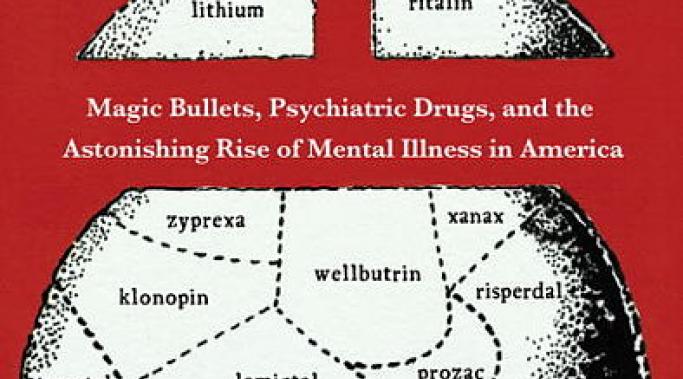Earlier this week I wrote a piece about being scared of trying antidepressants and as one commenter pointed out, there are increased risks associated with treating a person with bipolar with antidepressants. In fact, some would say that treating a bipolar person with antidepressants can worsen the course of the illness (always contraindicated as monotherapy and possibly undesirable altogether). Now, when I wrote the article I was only thinking of unipolar depressives, but, as one commenter pointed out, being diagnosed, correctly, with bipolar disorder, in itself, can be a challenge.
And this is absolutely true. Studies have found that it takes 5-10 years (from the time of the first episode) for a person with bipolar disorder to get an accurate diagnosis. There are many reasons for this, predominantly that people don’t get help when they have their first episode, but a major contributing factor is also misdiagnosis. People with bipolar disorder are often diagnosed with depression or schizophrenia first and this can have devastating outcomes.
Breaking Bipolar
I remember, before trying medication, I was terrified of it. I had the same misconceptions that many people do:
Medication is for weak people
Antidepressants are just “happy drugs” designed for people who can’t handle life
Medication will ruin your brain
Doctors give out antidepressants like candy whether you need them or not
As it turns out, none of these things are true, but they sure seemed true at the time.
So I get fear of antidepressants and other medication. Psych medication is scary stuff.
But sometimes you have to face that fear in order to get better.
For some reason people like to come on here and tell me (and sometimes others) that I’m not bipolar. They feel, for whatever reason, that my writing is not that of a person with bipolar and somehow it indicates that I’m not bipolar. I’m not expressing the right emotions. I’m not writing whatever it is that a “real” bipolar person would be writing.
And this happens in real life too. People somehow feel qualified to determine a person’s mental status simply by the way a person with bipolar acts in front of them.
Well, for the record, I would like to say from me, and all the other mentally ill people in the world: bite me (or, you know, us).
Many people here have read Robert Whitaker’s Anatomy of an Epidemic: Magic Bullets, Psychiatric Drugs, and the Astonishing Rise of Mental Illness in America (New York: Crown Publishers). And some of these people will likely claim that the book changed their lives or, at the very least, their view of psychiatry and psychiatric medication.
Well. Ho there. You would think with such a ground-breaking book I would be all over it.
Guess again.
I refuse to read Anatomy of an Epidemic. And yes, some people will fault me for this. But I have a good reason. I refuse to read Anatomy of an Epidemic as I have no desire to be outraged at a misunderstanding of science for 416 pages.
The Poster Child: Robert Whitaker
Robert Whitaker is the poster-child for antipsychiatry, which is his prerogative. If he enjoys talking to throngs of antipsychiatrists then I say, better him than me.
And part of his criticism of psychiatry is well-deserved. I would say that being concerned with the use, and possibly overuse, of some medications and the prescribing of heavy psychotropic medications to children is quite warranted. I take no issue with the fact that debate and concern is appropriate here.
What I do take concern with is his contention that psychiatric medication actually worsens treatment outcomes and causes disability. This is the reason why antipsychiatrits love him and it’s the reason I probably couldn’t stand to be in the same room as him.
I once wrote a post called, My Bipolar Symptoms Aren't Your Symptoms: I'm More Bipolar Than You. The point of the post is that two people can experience bipolar disorder very differently. Even when two people meet the Diagnostic and Statistical Manual of Mental Disorders (DSM) diagnostic criteria for bipolar disorder, their individual list of symptoms can be quite different. One might be expansive when manic, the other might be irritable. One might sleep too much when depressed, the other might sleep too little. And so on and so forth. Neither one of them is the “right” kind of bipolar and neither one of them is “more” bipolar, they are simply suffering from the same illness differently.
Similarly, treatments are also individual. What works for one person simply doesn’t work for another. And that’s OK.
The name “bipolar disorder” is seemingly self-explanatory. It’s disorder involving the two poles of emotion – depression and mania or hypomania. People often think of this as the poles of “sad” and “happy.” But as any person with bipolar disorder can tell you, mania or hypomania is not necessarily happy at all.
In my last post I talked about what it is to be an e-patient. These are the people who are engaged in their own healthcare - they are empowered patients. But if your relationship with your doctor is more passive, how do you become empowered?
Have you heard of the e-patient? If not, it’s OK, I hadn’t heard of them up until about a year ago either. And quite frankly, once I did hear the term, no one really explained it to me so I figured it was an “electronic” patient – maybe one who walked around with their health records on a USB stick, or maybe a cyborg patient (in which case, I qualify).
Well, it turns out that there aren’t a lot of cyborg patients and while an e-patient might walk around with their medical records, “e-patient” actually refers to patients who are equipped, enabled, empowered and engaged. And, depending on whom you ask, also educated, expressive, expert and electronic.
That’s a lot of stuff. And quite frankly, way too much pressure, so let’s boil it down – an e-patient is one who’s engaged with their own healthcare, and ideally, we all should be one.
If you’ve been poking around for mental health information for a while you’ve probably seen them: The people who decry psychiatry and all associated therapies. These people come in various shapes and forms but they often call themselves “psychiatric survivors” or “antipsychiatrists.” These are people who claim that psychiatry is evil and psychiatrists are nothing but abusers. These are people that claim that psychiatric medication will cook your brain and that those who use psychiatric services have simply been duped into believing the lies of “big pharma.”
It should surprise no one that I’m not a fan of these people. In my opinion, these people prevent sick people from getting the help they so badly need and they can cost someone their life.
And writing off psychiatry as a field of medicine reminds of refusing to eat Chinese food.
Mental illness symptoms are as cold and generic as inhumanly possible. “Depressed mood.” “Loss of energy or fatigue.” “Psychomotor retardation or agitation.”
Ah, yes, those things. They sound like a bummer.
Although, actually, they don’t. They sound like characteristics of a lab animal.
And one of the pesky symptoms of depression is “easy to tear.” You know, you cry a lot.
But everyone cries, so how bad could that possibly be?

![MP900255362[1]](/sites/default/files/styles/blog_listing/public/uploads/2012/06/MP9002553621.jpg?itok=ccR4teIZ)



![MP900262232[1]](/sites/default/files/styles/blog_listing/public/uploads/2012/05/MP9002622321.jpg?itok=hqxmkVBd)
![MP900386199[1]](/sites/default/files/styles/blog_listing/public/uploads/2012/05/MP9003861991.jpg?itok=UjPcJoRw)


